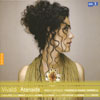Vivaldi Atenaide
Vivaldi ‘comes home’ and singers and musicians make it a welcome return
View record and artist detailsRecord and Artist Details
Composer or Director: Antonio Vivaldi
Genre:
Opera
Label: Vivaldi Edition
Magazine Review Date: 3/2008
Media Format: CD or Download
Media Runtime: 220
Mastering:
Stereo
DDD
Catalogue Number: OP30438

Tracks:
| Composition | Artist Credit |
|---|---|
| (L')Atenaide o sia Gli affetti generosi |
Antonio Vivaldi, Composer
Antonio Vivaldi, Composer Federico Maria Sardelli, Conductor Guillemette Laurens, Pulcheria, Mezzo soprano Modo Antiquo Nathalie Stutzmann, Marziano, Contralto (Female alto) Paul Agnew, Leontino, Tenor Romina Basso, Varane, Mezzo soprano Sandrine Piau, Atenaide/Eudossa, Soprano Stefano Ferrari, Probo, Tenor Vivica Genaux, Teodosio, Soprano |
Author: David Vickers
The essay by Frédéric Delaméa claims that Atenaide displays “deep stylistic originality combined with formidable musical riches”, and his view is supported by this consistently strong performance. Vivica Genaux, Nathalie Stutzmann and Guillemette Laurens all contribute some good dramatic singing, and Romina Basso’s creamy melodic singing is outstanding. In particular, the extraordinary monologue for the title-heroine in Act 3 is magnificently sung by Sandrine Piau. Conductor Sardelli argues that he is “more and more convinced of the need to…protect [Vivaldi] from the deplorable modern tendency to make him into a prodigious purveyor of eccentricities and of rhythmic and dynamic convulsions which are almost invariably arbitrary”. Unlike some of the flashier approaches to Vivaldi by some of the artists involved in Naïve’s compelling series of Vivaldi’s operas, Sardelli’s methods are never extreme for the sake of a cheap thrill. Here we find a sincere attempt to let the story unfold through clearly communicated and simply delivered recitatives and superbly paced arias, and Modo Antiquo play with plenty of vivaciousness and sonority. This performance always seems to have solid and deeply satisfying foundations.
Explore the world’s largest classical music catalogue on Apple Music Classical.
Included with an Apple Music subscription. Download now.

Gramophone Digital Club
- Digital Edition
- Digital Archive
- Reviews Database
- Events & Offers
From £9.20 / month
Subscribe
Gramophone Club
- Print Edition
- Digital Edition
- Digital Archive
- Reviews Database
- Events & Offers
From £11.45 / month
Subscribe
If you are a library, university or other organisation that would be interested in an institutional subscription to Gramophone please click here for further information.






